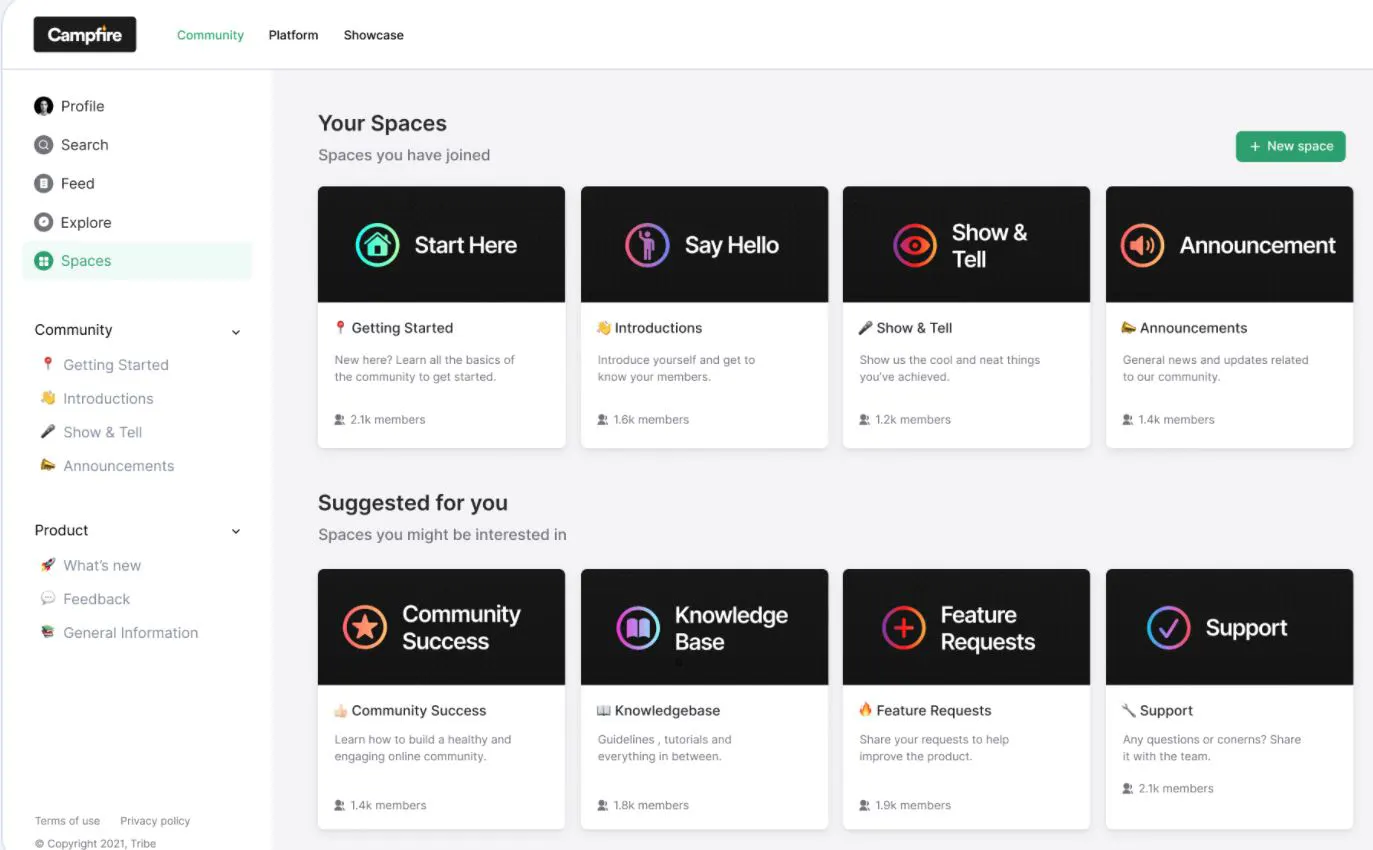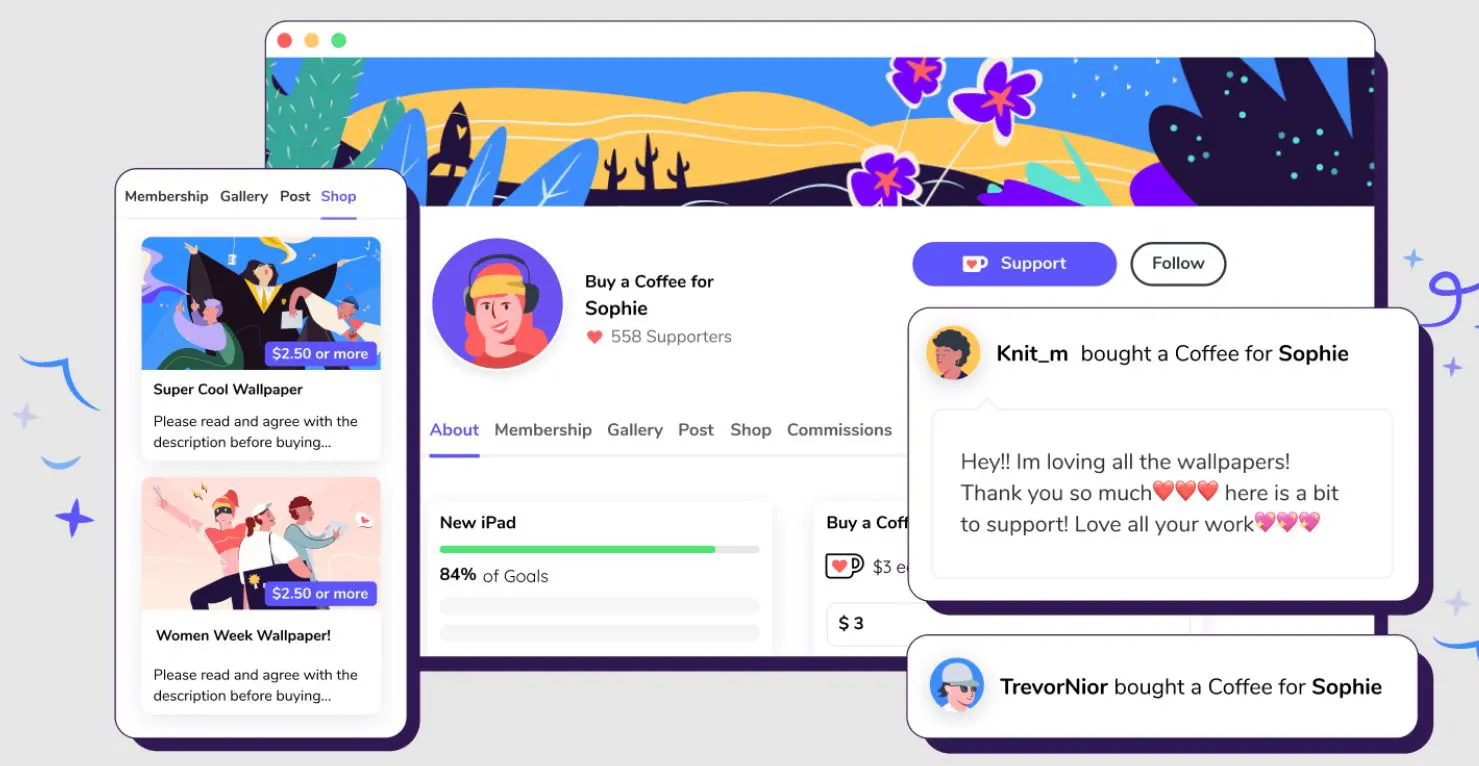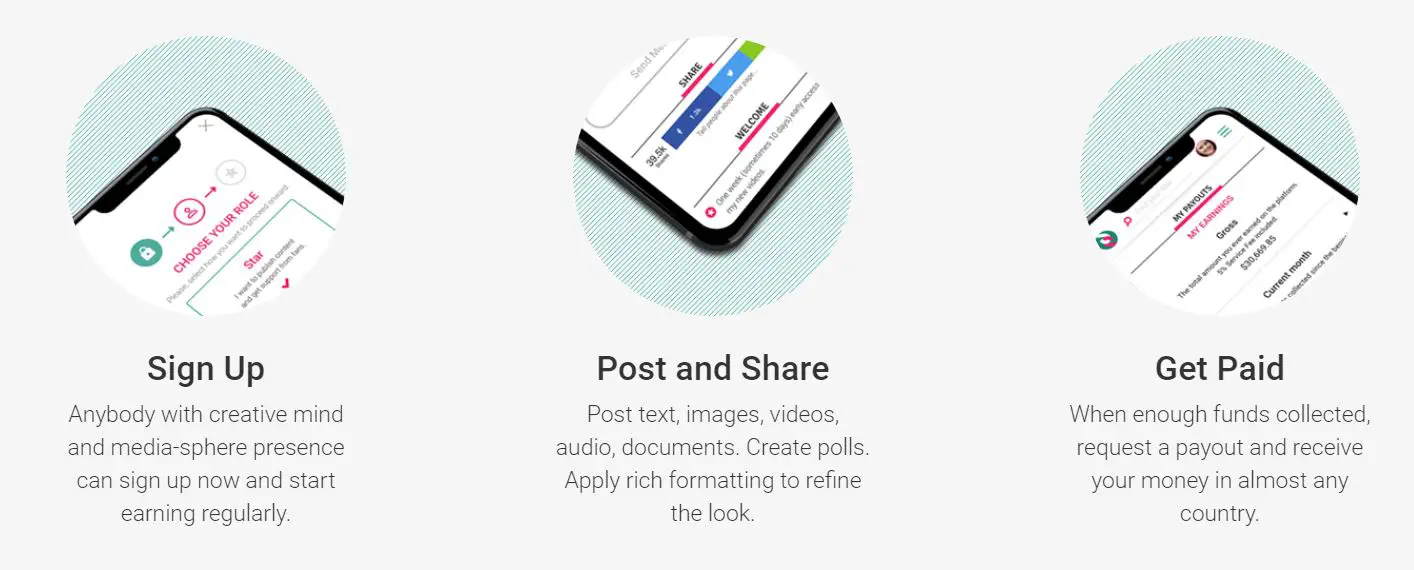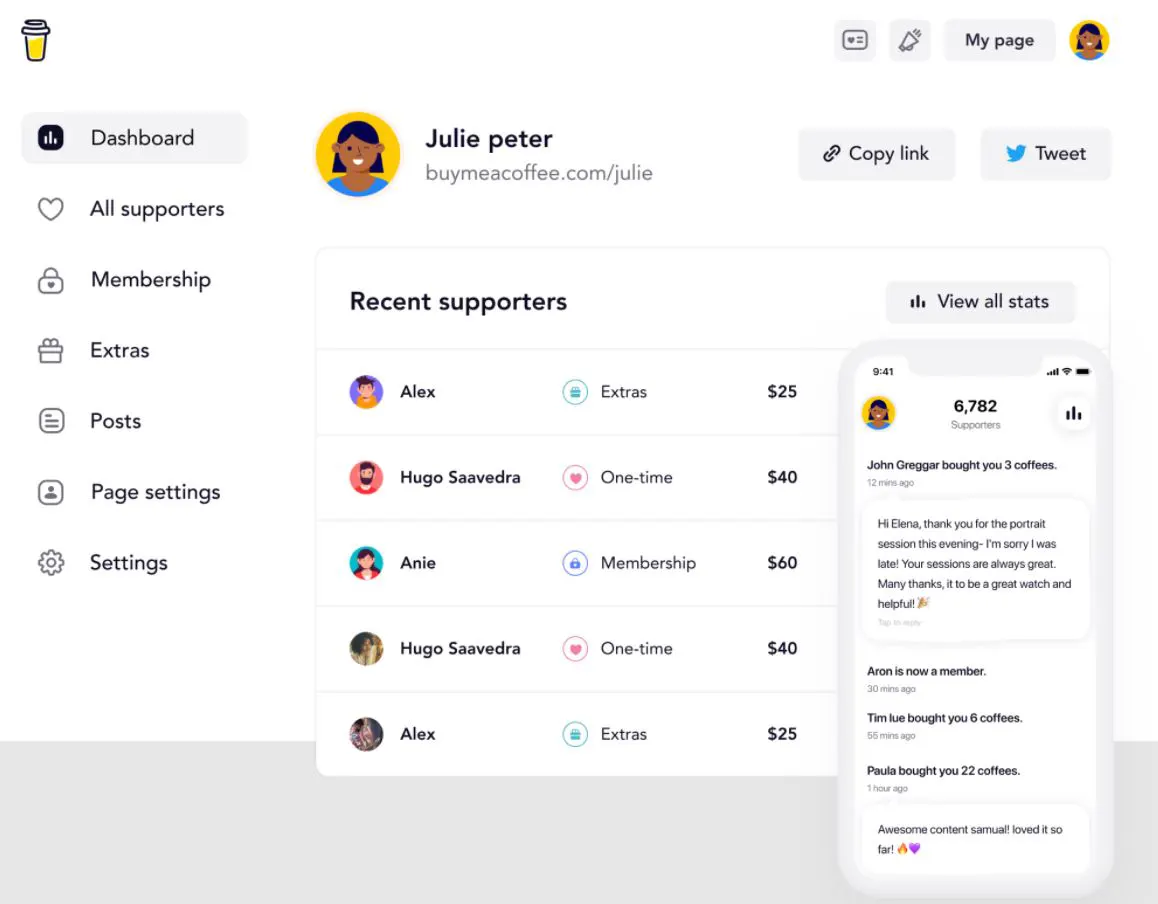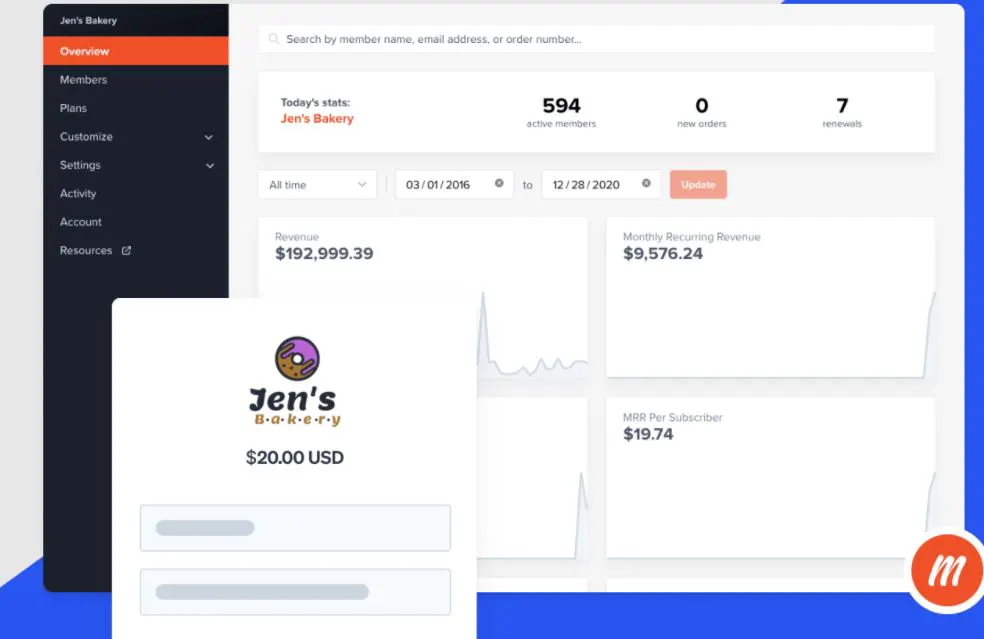Many digital media providers use the Patreon platform to augment their income. These include YouTubers, artists, game streamers, writers, podcasters, and comic book artists, to name a few.
The membership solutions enable them to engage with their followers while also earning consistent revenue from their material straightforwardly and straightforwardly.
Patreon, in contrast to other online revenue structures that are frequently insufficient and unreliable for content creators to receive payment, assures that they receive a consistent source of money with continuous support rather than in one go.
Unfortunately, Patreon has been the center of a censorship scandal that has left a sour taste in fans’ mouths and resulted in some of them abandoning the network. As people look for the finest Patreon alternatives, it has resulted in significant losses for creators.
What Exactly Is Patreon?
Patreon is a digital crowdfunding service that was launched in 2013 by a YouTube musician called Jack Conte and Sam Yam to support their creative projects.
To obtain a form of compensation from his audience for the pleasure they obtained from his work, Conte decided to build a website that would enable them to pay him directly for the pleasure they got from his work.
Using Patreon, admirers and patrons of content providers and artists may contribute to their works, making additional revenue from what in the past would be free content.
YouTubers and podcasters, and other content creators, have found success on the platform, which serves as an intermediary for fans who wish to make donations to their favorite content providers.
Using a subscription-based payment model, content creators can access tools for collecting, maintaining, and motivating their paying followers. Subscriptions are a type of payment that allows creators to access certain features.
It is a win-win approach since fans can see where their donations are being used, while creators will preserve their creative freedom and receive their justly earned income.
Fans will also get privy to exclusive membership privileges such as interactive encounters, exclusivity, and more access, as well as other perks.
The Patreon platform allows artists to establish subscription-based, monthly premium tiers with different degrees of content, each of which has its pledges for different rewards.
Patreon generates income by taking a 5 percent cut of the payments made to creators, who retain 90 percent of the income generated by their efforts.
However, there are also significant disadvantages to using Patreon. First, for the first month, only a limited number of rewards are available to new paying fans.
Also, Payment is processed at a snail’s pace. Moreover, due to censorship concerns, the fan base has shrunk significantly, resulting in significant losses.
Consider joining one from our list of Patreon alternatives if you produce content, are an influencer, or are YouTubers who aren’t seeing the degree of success you expected when you first signed up for the platform.
Best Patreon Alternatives – Our Top Pick 👌
1. Tribe
First on our list of Patreon alternatives is Tribe. The tribe is a robust and versatile platform that allows you to create branded and connected communities quickly and easily. Project leaders, marketers, developers, and customer service representatives benefit from the community platform.
You may use Tribe to give any brand a social component and to engage consumers in further debate and engagement under your brand’s umbrella brand.
Followers and explorers can post comments and upvotes on various content kinds. Users can also pose questions and initiate discussions about a variety of topics.
Because the service is white-label, you may personalize and adapt it to your company’s branding while also integrating it with your website. It is machine-learned and customized; you can also reward members by giving them virtual currency, which they may use to exchange for your services.
In contrast to other alternatives, which are focused on receiving donations from supporters and compensating them with high-quality content, this digital currency is focused on creating amazing content.
Tribe also provides smart targeting, which allows users to target audiences dependent on their activities in the community, as well as gamification, which allows users to encourage and credit followers through the use of point and badge systems.
The Tribe platform also integrates analytics and applications with over 20 popular business tools, such as Slack, Hubspot, Zapier, and Intercom, among others.
2. Heights Platform
In addition to offering native landing page development tools and payment systems, the Heights Platform enables you to launch great online courses with ease.
It also provides customization possibilities so that you may create a branded platform and a personalized domain for your business.
Coaching, Entrepreneurs, and consultants use the Heights Platform to instill a spirit of discovery in their pupils, allowing them to put their newfound information to work immediately.
Entrepreneurs may also monetize their skills and eliminate the need to spend time setting together complex and inflexible systems from the ground up.
In addition to analytics, gamification, sales tools, content editing, white-label branding, community development, hosting, and support, the Heights Platform provides a variety of other capabilities.
It also interacts with various other services, including Dropbox, Zapier, Google Drive, Instagram, Facebook Ads, and Google Analytics.
There are three distinct programs to pick from Basic, Pro, and Academy, each of which costs $39, $79, and $399, respectively. This price flexibility could be an advantage over other alternatives,
3. Ko-Fi
A fun and welcoming approach for creators to obtain assistance from their followers while still earning a living engaging in what they love is through the use of Ko-Fi. You can ask your admirers to support your project for the cost of a cup of coffee nicely and informally.
Unlike other Patreon alternatives, Ko-Fi does not impose a service fee on donations made through its platform. You may create a free profile page for yourself and use it to display your greatest work, arrange it into albums, and promote it with your fandom, all without having to pay anything.
Aside from that, you may create blogs and automatically inform fans of your objectives, creations, and upcoming works, allow them to activate rewards in exchange for a monthly membership or one-time donation, and commission exclusive pieces of work specifically for them.
Ko-Fi enables you to receive payment immediately and in full, generate a monthly income via memberships, and choose the number of slots you want to give on your terms and conditions. The commissions can be refunded if the client does not wish to accept them.
As a bonus, you may provide subscribers with special content such as courses, process videos, or an early peek at your work collection, among other things. As soon as a follower subscribes to the creator’s page, he will be paid directly and immediately.
Direct payment through PayPal or Stripe, notes of encouragement from fans, a gallery to promote your work, postings, rewards, targets, subscriptions, royalties, a paywall to offer exclusive material, and a WordPress plugin to ask for support are just a few of the services Ko-Fi provides.
Additionally, Ko-Fi allows users to get in-stream contribution notifications via Stream Alerts, as well as create a profile to showcase their creative personality.
If you want to earn three times as much money as you now do, the Ko-Fi Gold subscription is simply $6 per month.
There are unique posts and prizes, commission options, a shorter Ko-Fi username, gallery bonuses, analytics data, a shortened Ko-Fi name (as well as previews for forthcoming features), and no advertisements with the Gold package.
4. SubscribeStar – Patreon alternatives for writers
A subscription media service, SubscribeStar provides access to media content released by content producers (Stars) to customers or users who pay a fee for the privilege of doing so.
The independent platform, like Patreon, runs on a monthly fee basis and provides Stars with content marketplace capabilities so that they can be compensated for their efforts.
SubscribeStar is for any organization or individual who creates original, legal, and entertaining material regularly, regardless of size.
Content makers such as comedians, artists, bloggers, performers, musicians, podcasters, vloggers, commentators, fashionistas, and anybody else can use the platform, much like they can with Patreon. Your content and information are safeguarded, and you will receive detailed statistics and analytics reports.
In addition to fully complying with all industry laws, SubscribeStar’s price structure and guidelines are straightforward to comprehend.
You can create and manage a Star account at no cost, and the amount of money you make will be determined by the number of subscribers you have and the amount you set as your subscription fee.
The 5 percent service fee, as well as transaction service charges of 2.9 percent + $0.30 on average, are considered in the calculation.
In addition to these features, SubscribeStar offers a Trust Period, the ability to integrate with Google Analytics and Discord, anti-scraping protection, an API for integrating your applications with SubscribeStar, and rapid, secure payouts.
You will also get access to interactive polls that you can integrate with your material to reach your audience, external films that you can integrate from YouTube, Vimeo, and other sites, and two-factor authentication, among other things.
5. Liberapay
Liberapay is a service for artists who generate continuous software or material and wish to earn recurrent payments in exchange for their efforts. It is built on an open-source design and is available to everyone.
Liberapay, in contrast to Patreon, which allows authors to receive continual support from their followers, limits payments to €100.00 a week for each donor to eliminate external interference.
Liberapay is a crowdfunding platform that was founded in France in 2015 to assist fans in funding creators and projects that they enjoy.
You can produce free software, distribute free knowledge, and earn a secure crowdfunded basic income that will allow you to continue doing good work for the benefit of all people on the internet.
Creators get financial support in exchange for their freely available art, information, or software, and recurring contributions also support them.
Donors select the person or organization to which they wish to make a financial contribution, and they have complete control over when and how much they pay, as well as whether the donation is renewed manually or automatically. Donations are covered in advance, and donors are notified when their donations are renewed.
Creators, however, set up their websites where they describe their work and why they are looking for contributions.
Moreover, they explain to donors what their contributions will be used for and then accept payments using PayPal or Stripe, after which they contact followers to solicit their support.
Liberapay, in contrast to Patreon, which is managed and operated by Conte and Yam’s firm, is managed by a non-profit group and is built on open-source software.
The following are some of the capabilities you’ll get in Liberapay:-
- Teams allow project members to collect and distribute funds without forming a formal corporation.
- There are a variety of languages and currencies. It is accessible in 15 languages, with some form of translations available in ten additional languages and explanations available in 124 languages, according to the company. Euro, USD, and 33 other currencies are available; however, no crypto-currency is available.
- Connectivity to platforms such as Twitter, GitHub, and nine more platforms is possible.
- Pledges, which will be used to make donations to people who are not yet registered with Liberapay. They will receive the donations as soon as they join up. Sponsors such as non-profits and enterprises can also make donations through Liberapay.
The robust language choice is Liberapay’s advantage over other alternatives.
6. Buy Me a Coffee
The Buy Me a Coffee (BMC) program is cost-free, based on donations that started as a WordPress plugin, similar to Memberful but has evolved into a complete membership service for creators with time.
BMC, like Patreon, is intended to allow fans to make monthly or one-time contributions to support businesses they care about while also allowing creators to receive continuing support.
Your supporters can contribute to your income by sharing unique content, purchasing digital downloads, and donating to your cause.
According to the platform’s creators, it was launched in 2018, making it relatively new compared to Patreon. The platform offers three core monetization solutions: a WordPress plugin, Buttons, and Coffeelinks.
It is possible to apply buttons on various platforms, and they can be shown on your WordPress site together with a logomark.
Coffeelinks apply hyperlinks that users can send to their supporters, allowing them to donate to their cause.
When offering digital products, you can integrate the links with Dropbox, connect them to YouTube video links, or use them in conjunction with Typeform and other services.
When using BMC’s WordPress plugin, one can position the button anywhere they want on the site and have it automatically sync to their account.
Individuals are the focus of BMC, and your BMC page provides a pleasurable experience for your target audience. There is a one-tap payment option that eliminates the need for numerous sign-ups that other platforms require, and you may personalize your page to your taste.
The site takes a 5 percent share of the earnings of authors and processes payments through PayPal or Stripe, depending on the payment method.
BMC takes great effort to make transactions more relevant and less transactional; supporters are encouraged to buy you a cup of coffee rather than donate to you directly.
They utilize your extras rather than purchasing them, which allows producers to be successful on the platform.
BMC also listens to artists, releases exciting new features as they become available, and provides a community where creators can socialize.
If you are looking for free alternatives for Patreon, BMC is a great way to start.
7. Memberful
Memberful, similar to Patreon, was launched in 2013 to assist content creators in customizing the experiences for their fan bases and generating revenue through membership sales.
Although it is now a subsidiary of Patreon, which bought Memberful in 2018, it remains a WordPress plugin that allows for rapid expansion. As a result, Memberful is an excellent choice for media firms and larger corporations.
Memberful interacts with MailChimp as well as Stripe for regular financial transactions, and it enables members to subscribe to unique content through a subscription form.
It is possible to offer memberships to people who are interested in your content and who are willing to pay fees based on the subscription bundle you choose.
Memberful, on the other hand, is not a crowdfunding service like Patreon. Since it is a website plugin, one will only need to install it on their website, after which fans will be able to click for subscriptions and gain access to unique material.
Furthermore, you may configure Memberful to accept subscriptions for monthly, yearly, or other periods and the customers can choose from various content access levels.
Patreon recognized the parallels between Memberful and its offers and finally acquired the plugin, even though it continues to function as a stand-alone service.
Memberful connects with your podcasting workflow, allowing you to offer podcast memberships and generate dependable and recurring revenue streams.
You may also manage several shows, sell gift subscriptions, customize your website with your branding, offer group subscriptions, provide free trials, and create employee accounts.
You can choose from one of the company’s three subscription packages: the Starter, Pro, or Premium programs.
The Starter plan is free, whereas the Pro and Premium packages cost $25 a month and $100 a month, respectively, and include various additional features and incentives such as coupon codes and newsletter incorporation, among other things.
Features include analytic statistics on totals or revenue, automated syncing of user data to your WordPress website, single sign-on (SSO), an RSS feed option, and a paywall for restricted access, among others.
Memberful keeps a 10 percent cut of whatever you make before paying service charges on the Starter plan. The Pro and Premium packages reduce the platform charge to 4.9 percent of your earnings before paying service fees.
Although Memberful is now part of Patreon, it still appears on our list of best alternatives to patreon.
8. Podia
Podia is an all-in-one promotional platform that enables you to provide more than simply creative material to your customers and prospects.
Offering courses online and digital downloads, such as eBooks, video and audio, memberships, webinars, and many other things, are all possible options.
In addition, you can develop a website in minutes, including a storefront, sales pages, and other features, and increase your email list using the built-in email marketing tool.
Podia also allows you to speak in real time with visitors to your services using the inbuilt live chat tool, allowing you to engage with them, receive support, discover what they want you to do, and increase your sales. You are not required to pay anymore or use third-party services or apps to communicate.
A small business or startup with a limited budget will find a platform suitable for selling digital material, memberships, and online learning on the site.
This is in contrast to Patreon and most other alternatives, mostly for content creators who publish films, music, and other similar types of content to their websites.
Podia is essentially a creator-friendly Patreon alternative that was launched in 2014 and is now advertised as an e-learning site, similar to Lynda, Udemy, and other similar platforms, among others.
Podia works similarly to Patreon in that users can sell access to their work on an ongoing basis. However, they will not be charged on any donations made by their contributors; all you will be charged is a set monthly price for utilizing Podia.
There is a monthly membership package available. If you’d like to offer digital downloads or online learning, or if you are into email marketing campaigns, you’ll need to pay an additional $39 per month to get a subscription.
9. Indiegogo
You may look for creative ideas and support the next great thing on Indiegogo, a portal that provides crowdfunding campaigns and inventive items so that you can finance your next big thing.
The platform promotes itself as a platform where new product releases can be coordinated with several new and breakthrough products introduced to the market before they are generally available.
Thousands of projects started weekly with fantastic designs, cutting-edge technology, and other groundbreaking ideas, offering limited-time pricing and incentives to early backers.
Unlike Patreon, you have the potential to bring your idea to life and receive support from backers, regardless of whether your idea is philanthropic or artistic.
If a team cannot accomplish a project as anticipated, you can donate at your level of affordability. Also, you can assess campaigns as carefully as you do with Patreon’s campaign tracker.
There are several stories from various businesses that you can read, as well as campaigns that you may explore and analyze stages of development and potential hazards to production. This will assist you in determining which projects to sponsor and how you can assist them in achieving success.
While Patreon uses a subscription-based payment platform, Indiegogo uses a reward-based structure that lets backers raise money for entrepreneurs, ideas, products, and charitable causes through crowdfunding campaigns.
As with Patreon, Indiegogo charges a five percent service fee. However, unlike Patreon, fundraising is either everything or nothing or keep-whatever you raise, and it is only for one-time projects, unlike Kickstarter.
When comparing Indiegogo to Kickstarter, the biggest variation is that Indiegogo does not prescreen projects. While projects have a maximum duration of 60 days, you can create continuing campaigns once your initial campaign is successful.
10. Kickstarter
Kickstarter is an international crowdfunding service that was founded in 2009 and currently has more than 18 million contributors and 64 million pledges.
Art, games, music, theaters, films, design photography, and other material formats work well on the site.
Developers, authors, gamers, designers, musicians, support staff, and robot builders, to name a few, will consider Kickstarter to be an excellent forum for their ideas.
Unlike Patreon, which has a regular subscription, Kickstarter is best for one-time creative projects. Furthermore, if your campaign falls short of its fundraising goal, you will receive no compensation.
Compared to individuals who provide a steady stream of material, Kickstarter performs effectively for content creators who produce a few major works per year. You can even start a new campaign once the previous one has ended.
Compared to Patreon, Kickstarter is a much more restricted platform; therefore Isn’t among the Patreon alternatives for small-time authors.
Nevertheless, by the end of 2019, it has fully financed over 186,000 projects and received over $5.1 billion in commitments, making it one of the strongest Patreon alternatives.
The platform cost is 5 percent, equivalent to Patreon’s lowest-tier service, and campaigns must pass a rigorous pre-screening process before being accepted.
The campaigns should also be truthful, well-presented, and provide something worth sharing.
Projects are forbidden from offering equity, generating funds for charity, or promoting prohibited commodities.
Donors’ cards will be billed if the project achieves its deadline; else, the card will not be debited at all.
✅FAQ
Is there anything similar to Patreon?
While Patreon might be one of the biggest membership platforms, where different creators and artists can earn money through subscriptions, it might not always be the best for you.
Some other alternatives you can try are FaceBook, Buy Me a Coffee, Kickstarter, Kofi, etc. These platforms can also help you collect money in the form of crowdfunding as well as support for your content.
Is Ko-fi better than Patreon?
One of the biggest competitors for Patreon is Kofi. Both are amazing and allow creators to earn money through monetizing and donations.
However, Patreon charges you money for your donations and even the fans for donating money. But Kofi has no such charge for one-off donations, which is a huge advantage.
Is there a free version of Patreon?
Patreon is free for everyone who wants to get started on the platform. It all depends on the plan you choose while signing up, where the platform takes a small percentage of the money when you start earning on it. There are currently three plans that are Lite (5%), Pro (8%), and Premium (12%).
What percentage does Patreon take?
Patreon takes around 5%-12% of the money creators earn. It entirely depends on the different subscription plans any creator takes. Moreover, you are also charged a processing fee too along with this.
Does Ko-fi take a fee?
No, all the donations made to you directly go to your PayPal or stripe account. There is an option where you can choose to contribute a small part of your earnings to the platform, but it is an option that you can choose to opt-out of. However, once you start offering memberships, shop purchases, and commission sales, they take as low as 5% of it.
Is Buy Me a Coffee better than Ko-fi?
Both platforms have a massive advantage that they charge less from the creators as compared to Patreon.
When discussing Buy Me A Coffee, you do not need to create an account to accept donations, and they charge around 5% once you start earning any money on the platform.
However, Ko-fi charges 0% on one-off donations made to you. And only charges 5% for all other memberships and shop purchases which gives an edge compared to Buy Me a Coffee.
Conclusion
Patreon is a fantastic way for creators to showcase their greatest work while receiving assistance from their fans. Even in the most trying of situations, it may keep people going.
It does, however, have issues and drawbacks, which is why users and authors alike are always looking for Patreon alternatives.
One can use any of the ten Patreon alternatives on our chosen list, but we prefer Indiegogo. Indiegogo is not only free to use but also allows you to raise funds for philanthropic or artistic projects.
Furthermore, unlike Patreon and others products on our list, Indiegogo allows you to create a campaign and doesn’t pre-screen campaigns.
While your original Indiegogo campaign lasts a maximum of 60 days, you are allowed to launch additional campaigns based on the success of the first.
Indiegogo also levies you a 5% service fee but based on the scope of your project; you can choose between an all-or-nothing package or the keep-what-you-raise model.

























